Unit 7 Will people have robots- Section A (Grammar Focus-3c)课件(共27张PPT)
文档属性
| 名称 | Unit 7 Will people have robots- Section A (Grammar Focus-3c)课件(共27张PPT) | 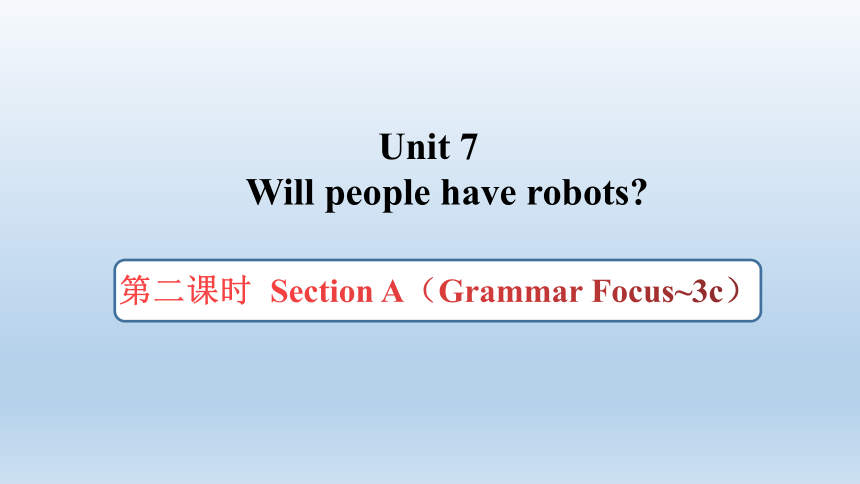 | |
| 格式 | pptx | ||
| 文件大小 | 578.6KB | ||
| 资源类型 | 教案 | ||
| 版本资源 | 人教新目标(Go for it)版 | ||
| 科目 | 英语 | ||
| 更新时间 | 2023-07-25 11:32:39 | ||
图片预览

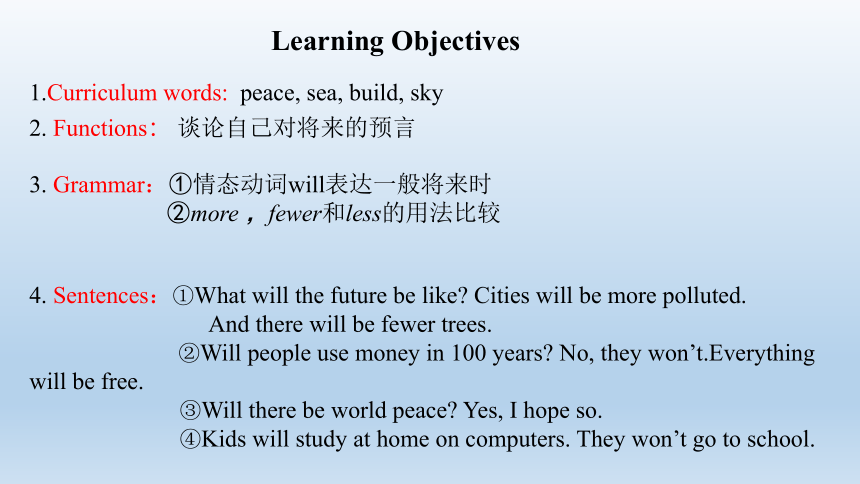
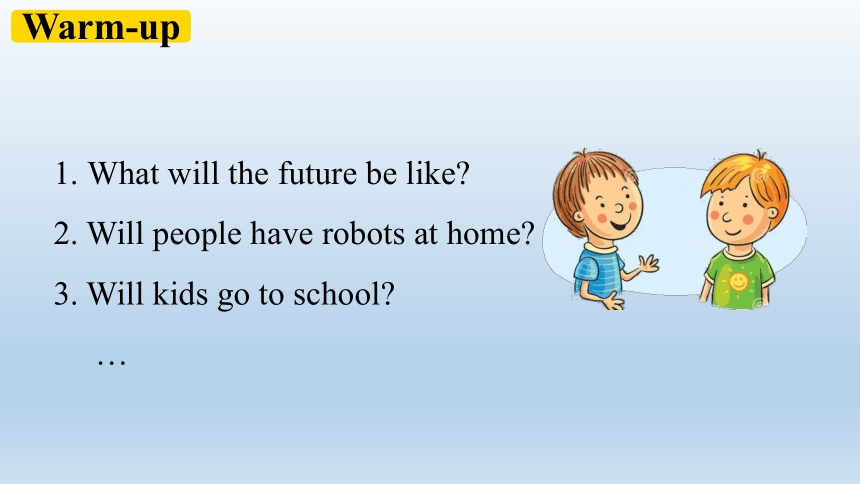
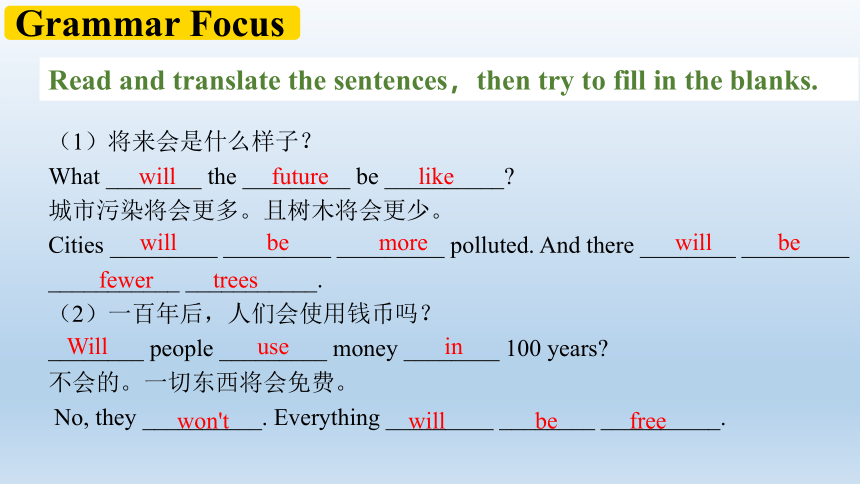
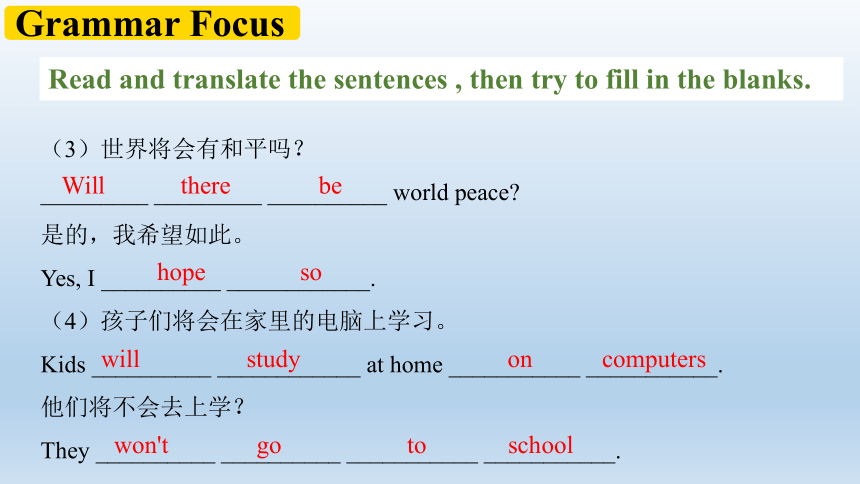
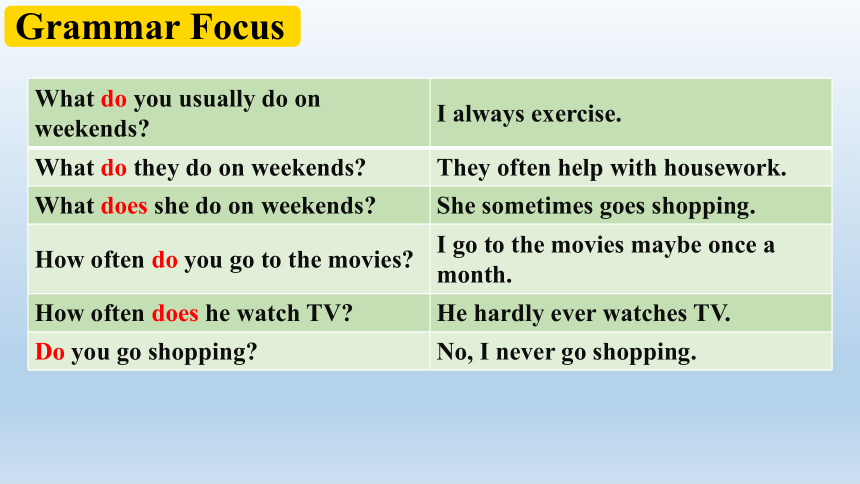
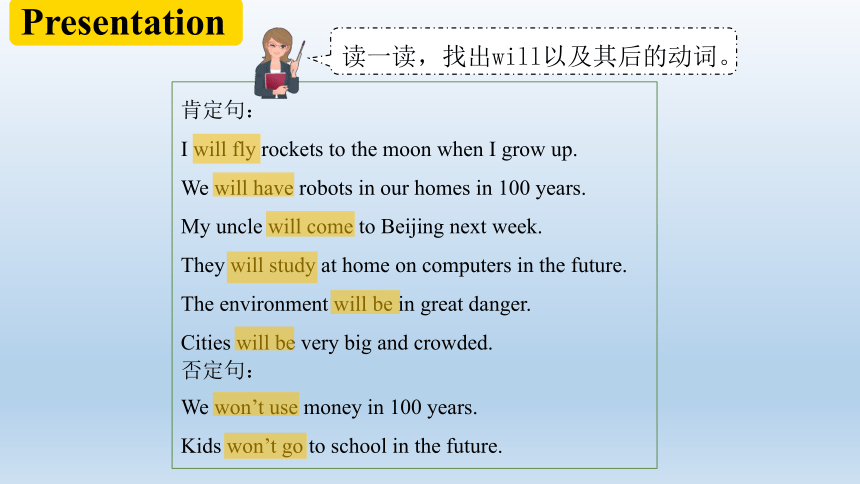
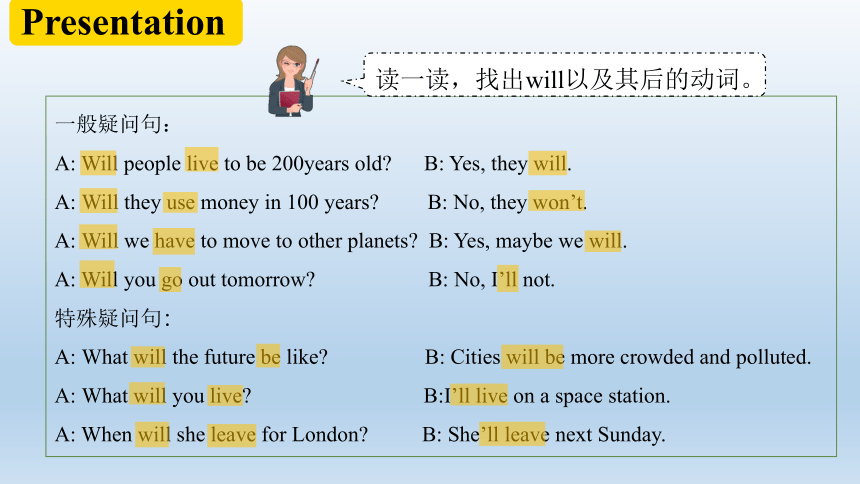
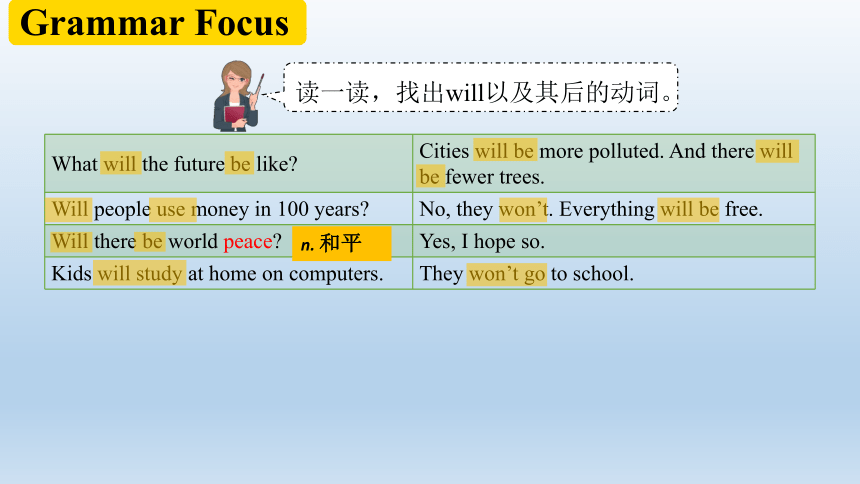
文档简介
(共27张PPT)
Unit 7
Will people have robots
第二课时 Section A(Grammar Focus~3c)
1.Curriculum words: peace, sea, build, sky
4. Sentences:①What will the future be like Cities will be more polluted.
And there will be fewer trees.
②Will people use money in 100 years No, they won’t.Everything will be free.
③Will there be world peace Yes, I hope so.
④Kids will study at home on computers. They won’t go to school.
2. Functions: 谈论自己对将来的预言
3. Grammar:①情态动词will表达一般将来时
②more ,fewer和less的用法比较
Learning Objectives
1. What will the future be like
2. Will people have robots at home
3. Will kids go to school
…
Warm-up
Read and translate the sentences,then try to fill in the blanks.
(1)将来会是什么样子?
What ________ the _________ be __________
城市污染将会更多。且树木将会更少。
Cities _________ _________ _________ polluted. And there ________ _________ ___________ ___________.
(2)一百年后,人们会使用钱币吗?
________ people _________ money ________ 100 years
不会的。一切东西将会免费。
No, they __________. Everything _________ ________ __________.
Grammar Focus
will future like
will be more
will be
fewer trees
Will use in
won't will be free
Read and translate the sentences , then try to fill in the blanks.
(3)世界将会有和平吗?
_________ _________ __________ world peace
是的,我希望如此。
Yes, I __________ ____________.
(4)孩子们将会在家里的电脑上学习。
Kids __________ ____________ at home ___________ ___________.
他们将不会去上学?
They __________ __________ ___________ ___________.
Grammar Focus
Will there be
hope so
will study on computers
won't go to school
What do you usually do on weekends I always exercise.
What do they do on weekends They often help with housework.
What does she do on weekends She sometimes goes shopping.
How often do you go to the movies I go to the movies maybe once a month.
How often does he watch TV He hardly ever watches TV.
Do you go shopping No, I never go shopping.
Grammar Focus
肯定句:
I will fly rockets to the moon when I grow up.
We will have robots in our homes in 100 years.
My uncle will come to Beijing next week.
They will study at home on computers in the future.
The environment will be in great danger.
Cities will be very big and crowded.
否定句:
We won’t use money in 100 years.
Kids won’t go to school in the future.
读一读,找出will以及其后的动词。
Presentation
一般疑问句:
A: Will people live to be 200years old B: Yes, they will.
A: Will they use money in 100 years B: No, they won’t.
A: Will we have to move to other planets B: Yes, maybe we will.
A: Will you go out tomorrow B: No, I’ll not.
特殊疑问句:
A: What will the future be like B: Cities will be more crowded and polluted.
A: What will you live B:I’ll live on a space station.
A: When will she leave for London B: She’ll leave next Sunday.
读一读,找出will以及其后的动词。
Presentation
What will the future be like Cities will be more polluted. And there will be fewer trees.
Will people use money in 100 years No, they won’t. Everything will be free.
Will there be world peace Yes, I hope so.
Kids will study at home on computers. They won’t go to school.
n. 和平
读一读,找出will以及其后的动词。
Grammar Focus
What will the future be like Cities will be more polluted. And there will be fewer trees.
Will people use money in 100 years No, they won’t. Everything will be free.
Will there be world peace Yes, I hope so.
Kids will study at home on computers. They won’t go to school.
我们在什么情况下使用一般将来时?
一般将来时标志性的助动词是什么?
Grammar Focus
What will the future be like Cities will be more polluted. And there will be fewer trees.
Will people use money in 100 years No, they won’t. Everything will be free.
Will there be world peace Yes, I hope so.
Kids will study at home on computers. They won’t go to school.
助动词will后的动词形式是什么?
助动词will与不同人称的主语搭配是否需要改变形式?
Grammar Focus
What will the future be like Cities will be more polluted. And there will be fewer trees.
Will people use money in 100 years No, they won’t. Everything will be free.
Will there be world peace Yes, I hope so.
Kids will study at home on computers. They won’t go to school.
一般将来时肯定句、否定句和一般疑问句的句子构成各是怎样的?
与一般将来时连用的时间状语是什么?
Grammar Focus
一般将来时既可表示将来某个时间要发生的动作或存在的状态,也可表示将来经常或反复发生的动作。其基本结构主要有"be going to+动词原形“和“will+动词原形”,本单元讲的是will型一般将来时。will本身没有人称和数的变化,常缩写为’ll。其否定形式为will not,常缩写为won’t。
一般将来时
语法概述
Grammar Focus
一般将来时的基本结构
类型 结构 例句
肯定句 主语+will+动词原形+其他 People will have robots in their homes in the future.
否定句 主语+won’t+动词原形+其他 People won’t have robots in their homes in the future.
一般疑问句及其肯定、否定回答 Will+主语+动词原形+其他? 肯定回答: Yes, 主语+will. 否定回答: No, 主语+won’t. —Will people have robots in their homes in the future
—Yes, they will.
—No, they won’t.
特殊疑问句 特殊疑问词(短语)+will+ 主语+动词原形+其他? Why will people have robots in their homes in the future
Grammar Focus
一般将来时的用法
“will+动词原形”常与表示将来的时间状语连用,如tomorrow, the day after tomorrow, next year , in the future等。
The Dragon Boat Festival is coming in a few days.
We will watch the boat races and eat zongzi on that day.
Grammar Focus
肯定句:
There will always be school. There will be less free time.
There will be only one country. There will be more pollution.
There will be a lot more people. There will be fewer trees.
一般疑问句:
A: Will there be world peace B: I hope so.
there be结构在一般将来时中的句子结构是什么呢?
Presentation
there be句型的一般将来时结构
there be句型的一般将来时结构: there will be;
其否定形式是在will后直接加not;
其一般疑问句形式是直接把will提到句首;
肯定回答为“ Yes, there will.”;否定回答为:“No, there won’t.”。
there be句型的一般将来时结构: there is/are going to be;
其否定形式是在is/are后直接加not;
其一般疑问句形式是直接把is/are提到句首;
肯定回答为“ Yes, there is/are.”;否定回答为:“No, there isn’t/aren’t”。
Grammar Focus
be going to往往表示将要发生的动作或安排,特别是打算、计划、决定要做的事。
一般将来时(will)常用来客观陈述将来某个时间要发生的动作或存在的状态(will作为情态动词常表意愿)。
will和be going to的区别
She is going to lend us her book. 她打算把书借给我们。
She will lend us her book. 她将会把书借给我们。
Grammar Focus
Countable nouns Uncountable nouns
There will be more people. There will be fewer trees. There will be more pollution.
There will be less free time.
more, less, fewer是哪些形容词的比较级?
more, less, fewer各搭配什么名词?
Grammar Focus
more 更多的 many和much的比较级 后跟可数名词复数或不可数名词
less 更少的 little的比较级 后只跟不可数名词
fewer 更少的 few的比较级 后只跟可数名词复数
Countable nouns Uncountable nouns
There will be more people. There will be fewer trees. There will be more pollution.
There will be less free time.
Grammar Focus
3a
Fill in the blanks with more, less or fewer.
In the future, there will be _____ fresh water because there will be _____ pollution in the sea.
2. In 100 years, there will be ______ cars because there will be ______ people in the cities.
3. There will be _____ jobs for people because _____ robots will do the same jobs as people.
4. I think there will be _____ cities because people will build ______ buildings in the country.
5. In 50 years, people will have ________ free time because there will be __________ things to do.
less
more
more
more
fewer
more
more
more
less/more
more/fewer
3b
Complete the predictions with what you think will happen.
1. Kids study at school now. In 100 years, ______________________________
2. I sometimes see blue skies in my city, but in the future_________________
________________________________________
3. People now usually live to be about 70-80 years old, but in the future
_________________________________________
4. Families usually spend time together on weekends, but maybe in 200
years_____________________________________
they will study at home on computers.
we will no longer see
blue skies because of air pollution.
people will live to be 200 years old.
families will spend less time together.
3c
Draw a picture of what you think a city in the future will be like. Then describe it to the class.
I think there will be more tall buildings, and there will be fewer cars and more buses.
I think there will be ______ people and _____ pollution.
A. fewer, many B. less, fewer C. more, less D. less, fewer
—________ will your mother come back
—In two days.
A.How soon B.How many C.How long D.How often
—There _____ a basketball game against Class Two this Sunday.
— I see. I will come and cheer you on.
A.will have B.is going to be
C.is going to have D.will to have
A
B
C
一、单项选择
Exercises
1
3
2
一、单项选择
— They will ________ a lot of trees on the mountain.
— Wow, sounds great.
A.planet B.plant C.plan D.plane
— ________ a new film next week.
— Really I will go to watch it.
A.There is B.There will have
C.There will be D.There is going to have
B
C
4
5
Exercises
二、用括号内所给词的适当形式填空
I have _________ (little) water than my sister.
There are ________ (few) girls in our class than in theirs.
________ Jim ________ (climb) the mountains tomorrow
I’m sure there ________ (be) robots in my home in the future.
His father __________ (not be) back home in a week.
less
fewer
Will
will be
won’t be
climb
1
3
2
4
5
Exercises
1. Recite the usage of the simple future tense.
2. Write at least 5 sentences to describe what a future city will be like.
Homework
Unit 7
Will people have robots
第二课时 Section A(Grammar Focus~3c)
1.Curriculum words: peace, sea, build, sky
4. Sentences:①What will the future be like Cities will be more polluted.
And there will be fewer trees.
②Will people use money in 100 years No, they won’t.Everything will be free.
③Will there be world peace Yes, I hope so.
④Kids will study at home on computers. They won’t go to school.
2. Functions: 谈论自己对将来的预言
3. Grammar:①情态动词will表达一般将来时
②more ,fewer和less的用法比较
Learning Objectives
1. What will the future be like
2. Will people have robots at home
3. Will kids go to school
…
Warm-up
Read and translate the sentences,then try to fill in the blanks.
(1)将来会是什么样子?
What ________ the _________ be __________
城市污染将会更多。且树木将会更少。
Cities _________ _________ _________ polluted. And there ________ _________ ___________ ___________.
(2)一百年后,人们会使用钱币吗?
________ people _________ money ________ 100 years
不会的。一切东西将会免费。
No, they __________. Everything _________ ________ __________.
Grammar Focus
will future like
will be more
will be
fewer trees
Will use in
won't will be free
Read and translate the sentences , then try to fill in the blanks.
(3)世界将会有和平吗?
_________ _________ __________ world peace
是的,我希望如此。
Yes, I __________ ____________.
(4)孩子们将会在家里的电脑上学习。
Kids __________ ____________ at home ___________ ___________.
他们将不会去上学?
They __________ __________ ___________ ___________.
Grammar Focus
Will there be
hope so
will study on computers
won't go to school
What do you usually do on weekends I always exercise.
What do they do on weekends They often help with housework.
What does she do on weekends She sometimes goes shopping.
How often do you go to the movies I go to the movies maybe once a month.
How often does he watch TV He hardly ever watches TV.
Do you go shopping No, I never go shopping.
Grammar Focus
肯定句:
I will fly rockets to the moon when I grow up.
We will have robots in our homes in 100 years.
My uncle will come to Beijing next week.
They will study at home on computers in the future.
The environment will be in great danger.
Cities will be very big and crowded.
否定句:
We won’t use money in 100 years.
Kids won’t go to school in the future.
读一读,找出will以及其后的动词。
Presentation
一般疑问句:
A: Will people live to be 200years old B: Yes, they will.
A: Will they use money in 100 years B: No, they won’t.
A: Will we have to move to other planets B: Yes, maybe we will.
A: Will you go out tomorrow B: No, I’ll not.
特殊疑问句:
A: What will the future be like B: Cities will be more crowded and polluted.
A: What will you live B:I’ll live on a space station.
A: When will she leave for London B: She’ll leave next Sunday.
读一读,找出will以及其后的动词。
Presentation
What will the future be like Cities will be more polluted. And there will be fewer trees.
Will people use money in 100 years No, they won’t. Everything will be free.
Will there be world peace Yes, I hope so.
Kids will study at home on computers. They won’t go to school.
n. 和平
读一读,找出will以及其后的动词。
Grammar Focus
What will the future be like Cities will be more polluted. And there will be fewer trees.
Will people use money in 100 years No, they won’t. Everything will be free.
Will there be world peace Yes, I hope so.
Kids will study at home on computers. They won’t go to school.
我们在什么情况下使用一般将来时?
一般将来时标志性的助动词是什么?
Grammar Focus
What will the future be like Cities will be more polluted. And there will be fewer trees.
Will people use money in 100 years No, they won’t. Everything will be free.
Will there be world peace Yes, I hope so.
Kids will study at home on computers. They won’t go to school.
助动词will后的动词形式是什么?
助动词will与不同人称的主语搭配是否需要改变形式?
Grammar Focus
What will the future be like Cities will be more polluted. And there will be fewer trees.
Will people use money in 100 years No, they won’t. Everything will be free.
Will there be world peace Yes, I hope so.
Kids will study at home on computers. They won’t go to school.
一般将来时肯定句、否定句和一般疑问句的句子构成各是怎样的?
与一般将来时连用的时间状语是什么?
Grammar Focus
一般将来时既可表示将来某个时间要发生的动作或存在的状态,也可表示将来经常或反复发生的动作。其基本结构主要有"be going to+动词原形“和“will+动词原形”,本单元讲的是will型一般将来时。will本身没有人称和数的变化,常缩写为’ll。其否定形式为will not,常缩写为won’t。
一般将来时
语法概述
Grammar Focus
一般将来时的基本结构
类型 结构 例句
肯定句 主语+will+动词原形+其他 People will have robots in their homes in the future.
否定句 主语+won’t+动词原形+其他 People won’t have robots in their homes in the future.
一般疑问句及其肯定、否定回答 Will+主语+动词原形+其他? 肯定回答: Yes, 主语+will. 否定回答: No, 主语+won’t. —Will people have robots in their homes in the future
—Yes, they will.
—No, they won’t.
特殊疑问句 特殊疑问词(短语)+will+ 主语+动词原形+其他? Why will people have robots in their homes in the future
Grammar Focus
一般将来时的用法
“will+动词原形”常与表示将来的时间状语连用,如tomorrow, the day after tomorrow, next year , in the future等。
The Dragon Boat Festival is coming in a few days.
We will watch the boat races and eat zongzi on that day.
Grammar Focus
肯定句:
There will always be school. There will be less free time.
There will be only one country. There will be more pollution.
There will be a lot more people. There will be fewer trees.
一般疑问句:
A: Will there be world peace B: I hope so.
there be结构在一般将来时中的句子结构是什么呢?
Presentation
there be句型的一般将来时结构
there be句型的一般将来时结构: there will be;
其否定形式是在will后直接加not;
其一般疑问句形式是直接把will提到句首;
肯定回答为“ Yes, there will.”;否定回答为:“No, there won’t.”。
there be句型的一般将来时结构: there is/are going to be;
其否定形式是在is/are后直接加not;
其一般疑问句形式是直接把is/are提到句首;
肯定回答为“ Yes, there is/are.”;否定回答为:“No, there isn’t/aren’t”。
Grammar Focus
be going to往往表示将要发生的动作或安排,特别是打算、计划、决定要做的事。
一般将来时(will)常用来客观陈述将来某个时间要发生的动作或存在的状态(will作为情态动词常表意愿)。
will和be going to的区别
She is going to lend us her book. 她打算把书借给我们。
She will lend us her book. 她将会把书借给我们。
Grammar Focus
Countable nouns Uncountable nouns
There will be more people. There will be fewer trees. There will be more pollution.
There will be less free time.
more, less, fewer是哪些形容词的比较级?
more, less, fewer各搭配什么名词?
Grammar Focus
more 更多的 many和much的比较级 后跟可数名词复数或不可数名词
less 更少的 little的比较级 后只跟不可数名词
fewer 更少的 few的比较级 后只跟可数名词复数
Countable nouns Uncountable nouns
There will be more people. There will be fewer trees. There will be more pollution.
There will be less free time.
Grammar Focus
3a
Fill in the blanks with more, less or fewer.
In the future, there will be _____ fresh water because there will be _____ pollution in the sea.
2. In 100 years, there will be ______ cars because there will be ______ people in the cities.
3. There will be _____ jobs for people because _____ robots will do the same jobs as people.
4. I think there will be _____ cities because people will build ______ buildings in the country.
5. In 50 years, people will have ________ free time because there will be __________ things to do.
less
more
more
more
fewer
more
more
more
less/more
more/fewer
3b
Complete the predictions with what you think will happen.
1. Kids study at school now. In 100 years, ______________________________
2. I sometimes see blue skies in my city, but in the future_________________
________________________________________
3. People now usually live to be about 70-80 years old, but in the future
_________________________________________
4. Families usually spend time together on weekends, but maybe in 200
years_____________________________________
they will study at home on computers.
we will no longer see
blue skies because of air pollution.
people will live to be 200 years old.
families will spend less time together.
3c
Draw a picture of what you think a city in the future will be like. Then describe it to the class.
I think there will be more tall buildings, and there will be fewer cars and more buses.
I think there will be ______ people and _____ pollution.
A. fewer, many B. less, fewer C. more, less D. less, fewer
—________ will your mother come back
—In two days.
A.How soon B.How many C.How long D.How often
—There _____ a basketball game against Class Two this Sunday.
— I see. I will come and cheer you on.
A.will have B.is going to be
C.is going to have D.will to have
A
B
C
一、单项选择
Exercises
1
3
2
一、单项选择
— They will ________ a lot of trees on the mountain.
— Wow, sounds great.
A.planet B.plant C.plan D.plane
— ________ a new film next week.
— Really I will go to watch it.
A.There is B.There will have
C.There will be D.There is going to have
B
C
4
5
Exercises
二、用括号内所给词的适当形式填空
I have _________ (little) water than my sister.
There are ________ (few) girls in our class than in theirs.
________ Jim ________ (climb) the mountains tomorrow
I’m sure there ________ (be) robots in my home in the future.
His father __________ (not be) back home in a week.
less
fewer
Will
will be
won’t be
climb
1
3
2
4
5
Exercises
1. Recite the usage of the simple future tense.
2. Write at least 5 sentences to describe what a future city will be like.
Homework
同课章节目录
- Unit 1 Where did you go on vacation?
- Section A
- Section B
- Unit 2 How often do you exercise?
- Section A
- Section B
- Unit 3 I'm more outgoing than my sister.
- Section A
- Section B
- Unit 4 What's the best movie theater?
- Section A
- Section B
- Unit 5 Do you want to watch a game show?
- Section A
- Section B
- Unit 6 I'm going to study computer science.
- Section A
- Section B
- Unit 7 Will people have robots?
- Section A
- Section B
- Unit 8 How do you make a banana milk shake?
- Section A
- Section B
- Unit 9 Can you come to my party?
- Section A
- Section B
- Unit 10 If you go to the party, you'll have a grea
- Section A
- Section B
